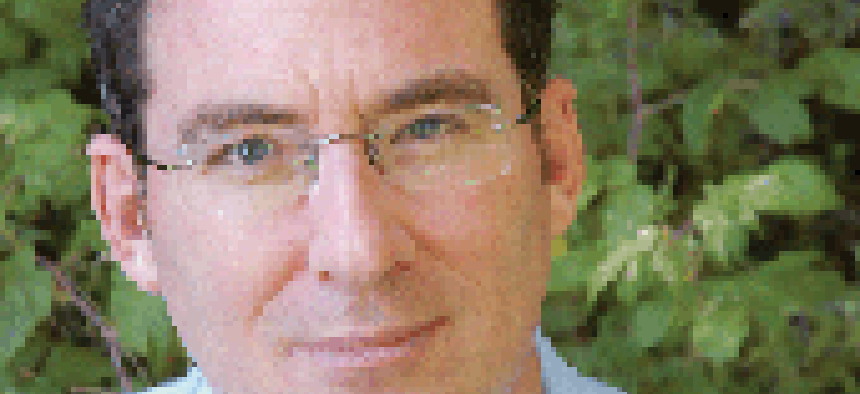Last byte | Be green, feel good and be competitive

A conversation with William Kemp, author and vice president of engineering at Powerbase Automation Systems Inc.
A combination of things. There'srenewed interest in the environmentalissue; people are a little bit afraid ofwhat's happening with climate change andgreenhouse gas emissions. But I think it ismore than that. We're starting to see ashift in convergence of functions of reality.We're seeing cost increases in the price ofall fossil fuels, and rising demand in thedeveloping world. At the same time, asrenewable [resources] become more popular,mass-produced and better engineered,they become more reliable and cheaper. Sowhat we see is a trend of renewable technologyprices going down, fossil fuel prices goingup and, at some point, there's an intersection. Political policy is important becausegood governance usually moves toward themost sustainable approach in the long term.There's also the psychology of the way peopleuse energy here in North America. We arevery wasteful. In Ontario, we consume 21⁄2times more energy than Germans do, and wehave roughly the same weather and socialbenefits. What happens is we become less competitive.There has to be more than a warm,touchy-feely feeling about environmental benefits.We have to see the entire ripple effect of theadvantages. We have to see the advantages offixed-price fuel so that we can have long-termstability for fuel prices, which you get from sunshineand you don't get from fossil fuels. Data rooms are becoming bigger andbigger, but at the same time, they are becomingmore energy efficient for each gigaflop ofcomputing capacity that is available. We haveto be looking at the most efficient ways of producingnot only our equipment that's beingbuilt but the designs of the electronics.Processing speed and memory capacity arevery important in IT, but we also need to makesure processors are running at theiroptimum energy capacity. There are isolated caseswhere companies generate theirown power and become embeddedgenerators. This has been very commonin hospitals for many years.They purchase natural gas in hugevolumes and burn it directly in boilers.And what they have found isthey can increase their efficiencyfrom running the boilers with thenatural gas to running gas turbinejet engines for electricity. The wasteheat that comes off, they can use forheating and hot water and cleaning. It is always better to use energy moreefficiently first, then to use a renewable energysecond. The Condé Nast building in New YorkCity is a good example of a combination.There's basically no waste in the building at all.There is a lot of use of daylight with automaticdimming lights. Fuel cell technology uses naturalgas to generate electricity and heat for thebuilding at very high efficiency levels.
 William Kemp and his wife, Lorraine, built a super energy-efficient house
William Kemp and his wife, Lorraine, built a super energy-efficient house
on a rural lakeside lot in Ontario. They use photovoltaic panels and wind
power to produce electricity. Solar thermal technology heats the water and the
house. Kemp does not advocate that others go to that extreme, but he does
advocate energy efficiency as a competitive advantage. Kemp, who is vice
president of engineering at Powerbase Automation Systems Inc., has written
books on the subject: "Renewable Energy Handbook" and "$mart Power," an
urban guide to renewable energy and efficiency. Staff writer Doug Beizer
recently spoke with Kemp about energy efficiency and innovative thinking.
Q: What has led to the increased interest
in renewable energy?
Kemp:
Q: How do we break out of traditional ways
of thinking about energy?
Kemp:
Q: What are the implications of so much
waste?
Kemp:
Q: What should people think about when it
comes to powering and cooling information
technology infrastructures?
Kemp:
Q: What success stories have you
seen?
Kemp:
Q: What are the lessons learned
from such success stories?
Kemp:

on a rural lakeside lot in Ontario. They use photovoltaic panels and wind
power to produce electricity. Solar thermal technology heats the water and the
house. Kemp does not advocate that others go to that extreme, but he does
advocate energy efficiency as a competitive advantage. Kemp, who is vice
president of engineering at Powerbase Automation Systems Inc., has written
books on the subject: "Renewable Energy Handbook" and "$mart Power," an
urban guide to renewable energy and efficiency. Staff writer Doug Beizer
recently spoke with Kemp about energy efficiency and innovative thinking.
Q: What has led to the increased interest
in renewable energy?
Kemp:
Q: How do we break out of traditional ways
of thinking about energy?
Kemp:
Q: What are the implications of so much
waste?
Kemp:
Q: What should people think about when it
comes to powering and cooling information
technology infrastructures?
Kemp:
Q: What success stories have you
seen?
Kemp:
Q: What are the lessons learned
from such success stories?
Kemp:
NEXT STORY: ITT defense chief Gaffney moves on

